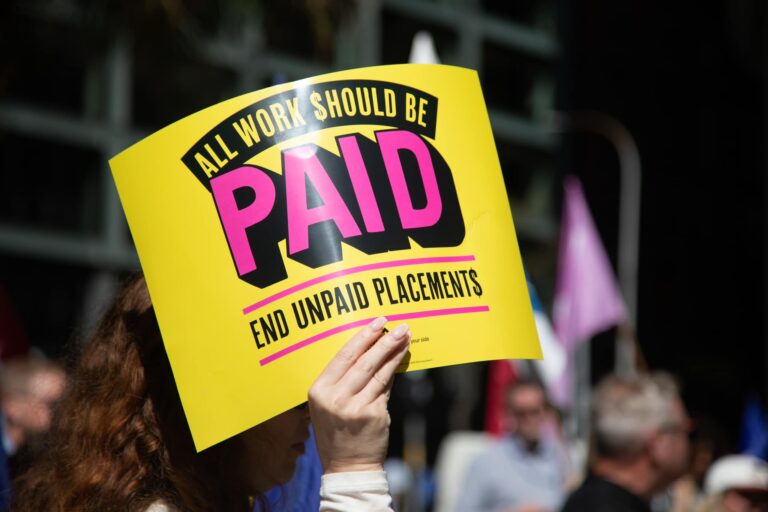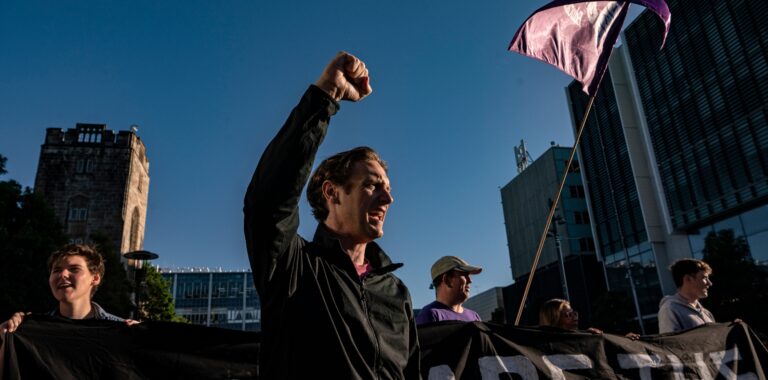
ALP: Just Don’t Mention Tasmania
In Tasmania, logging behemoth Gunns is still lurching toward construction of the world’s largest pulp mill in the Tamar Valley.
Launched in 2005, the Tamar Residents Action Committee (TRAC) quickly realised that they weren’t alone so they evolved to become TAP – Tasmanians Against The Pulp Mill. Recognising the pulp mill process as the latest festering jewel in a rotting crown of political whoredom, they further expanded their own mandate to become Tap Into A Better Tasmania.
Co-founder and chairman Bob McMahon and a very vocal delegation recently made the journey to Sydney, where over three days they heckled, drummed, and projected video of decimated forests at the fringes of the ALP’s national conference at Darling Harbour.
McMahon is an unusual activist. Working in tandem with his wife and a broad network of neighbours and experts, he is a genuinely community-based volunteer organiser. Undaunted by a struggle already longer than World War I, he is realistic about the challenges TAP faces but also pragmatic about successes so far.
For instance, he feels that since the 1980s when community action stopped the Wesley Vale pulp mill, unionists and forestry proxies have made sure to insert themselves at almost every level of regional and departmental influence in Tasmania. But he also points out that it was action by TAP which led to former Premier Paul ‘Big Red’ Lennon’s graceless departure from office.
At a time when Tasmania’s generally well-behaved media didn’t seem interested enough to ask, TAP commissioned approval polls to measure public support for Lennon’s particular style of corporate accommodation. The first poll scored him at 23 per cent – George Bush numbers. The second scored him at 14 per cent – Malcolm Turnbull numbers. Literally within days, he ‘retired’.
Also unusually, when McMahon talks about Tasmania’s two-party one-ideology governance as fascism, it is not as a reactionary short-term socialist mouthing platitudes, but as a self-taught student of history. More specifically, he is referring to Benito Mussolini’s description of fascism as the alignment of corporate interest and state action.
On the one hand, McMahon refers to the last state election in Tasmania, where Labor promised to champion Gunns’ the pulp mill and the Liberals countered by promising to also support it – “only more so”. On the other, he is still scandalised by the fact that lawyers from Gunns worked with the Tasmanian Labor Government to write the legislation that saw Parliament approve the mill in the first place.
Such are the reasons why TAP has not followed environmental NGOs into battle through the court system, seeing the legal process as a deliberate and costly diversion from more strategic and promising alternatives.
In his early days as head prefect, newly-minted Premier David Bartlett proclaimed Tassie’s need for greater transparency and accountability, for no more unquestioning diversion of public moneys into private logging roads and infrastructure, and for a long overdue ‘line in the sand’.
“That line quickly washed away,” says McMahon, but even among the Premier’s weasel words there was a crystalline commitment that government would not forcibly acquire land for the essential pipeline carrying water to Gunns’ proposed mill.
Working with landowners, TAP has already secured commitments ensuring that at least 19 kilometres of pipeline can’t be built – at least, not without an already embedded government fatally reversing itself.
Similarly, working with public interest lobbyists GetUp and The Wilderness Society, the campaign against the pulp mill has so far secured assurances from ANZ – Gunns’ lead banker, Australia’s other leading banks and a number of international finance houses that they will not bankroll the project. Gunns is courting European financial and operational partners, but possible suitors are rumoured to be increasingly attaching stringent demands to the possibility of their involvement.
The major push now is for PM Kevin Rudd to extend his squeaky cleanness beyond the op-ed pages of Sydney’s newspapers and into the darkest and most forsaken corners of federal and state Labor politics, where union and lobbyist bullying and scaremongering somehow meet policy formation and financing.
Following the lead of ultra-conservative Liberal Senator Eric Abetz, the ALP’s Minister for Agriculture, Fisheries and Forestry, Tony Burke, has thrown his hat into the circle of ecstatic believers. On June 24 in a speech to Parliament, Burke echoed a number of questionable claims made on Gunns’ own website about the future benefits of the pulp mill.
A number of independent experts have forecast that the mill will ultimately create around 290 long-term jobs. Gunns’ chief John Gay claims it will create 1600. Burke – in what TAP allege was the sackable action of misleading Parliament – proclaimed that the pulp mill will create 8000 long-term jobs.
“Timber, woodchips, pulp, whatever – these are a forestry by-product,” says McMahon. “Their core business is still government subsidies.”
Between state and federal Labor governments, McMahon estimates that Gunns and its partners at Forestry Tasmania receive the equivalent of $250 million in public money every year. With continuing federal support for the pulp mill – even amidst global economic and environmental crises, and even as smaller Tasmanian sawmills and logging operators go out of business – this amount is set to increase.









